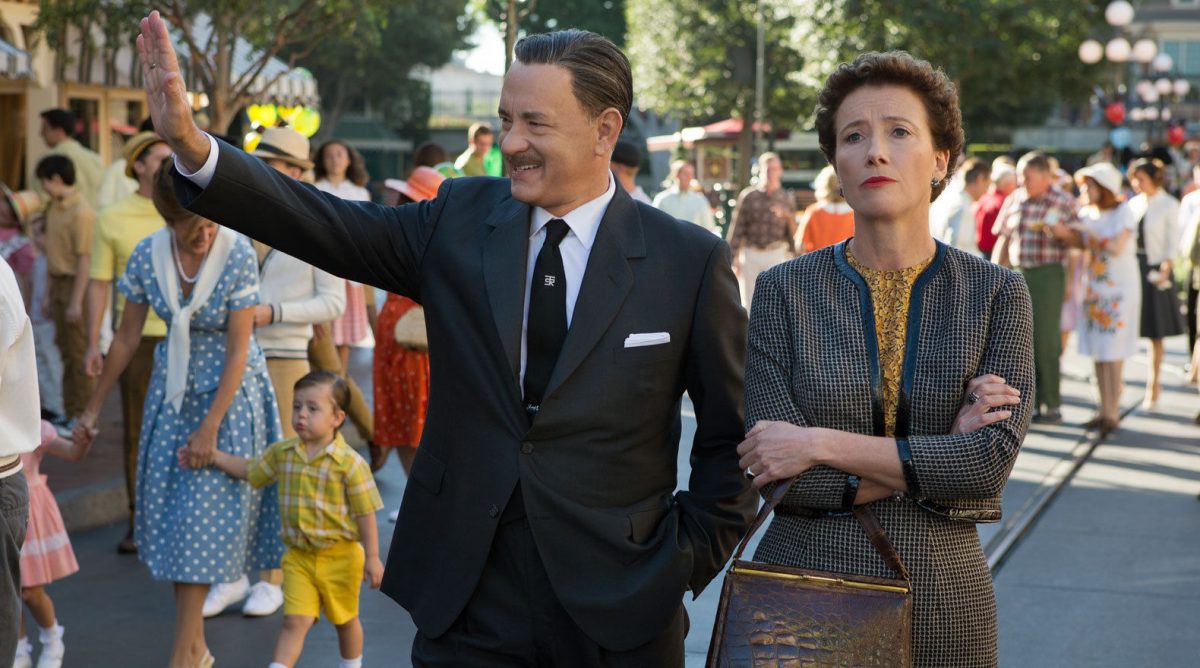 (3.5 / 5)
(3.5 / 5)
Try to think of an occasion on which you’ve seen the celebrated Mr. Walt Disney portrayed in film.
Simply put, you can’t: the Disney corporation has fiercely guarded the image of their founder, almost as fiercely as their iconic mascot. It’s only now, some 47 years after his death, that the creator of the beloved Mickey Mouse makes his first appearance in fiction. Who better then to capture his twinkly geniality than another cinematic legend, Tom Hanks?
Saving Mr. Banks, though, is not the story of Disney and the birth of his dream factory, but of P.L. Travers, author of Mary Poppins, and Disney’s attempt to solicit from her the movie rights.
Miss Travers – as she insists on being known – is played by none other than Emma Thompson, a British national treasure perhaps best known for her Oscar-nominated performance in Remains of the Day. Travers herself, however, is more reminiscent of Anthony Hopkins’ character in that same film: prim, fastidious, and nursing a secret wound.
Saving Mr. Banks focuses on a trip Travers made to California in 1961, brought there that Walt Disney might try his charm in person.
Frequent flashbacks to Travers’ childhood in rural Australia serve to illuminate her attachment to her creation, especially as she relates to the figure of her roguishly charming but put-upon alcoholic father (Colin Farrell). If this sounds like a dark, complex topic for a Disney movie, it is, of course, never less than family friendly in its treatment.
Of course, the film has a lot of fun in its evocation of the classic movie. Thompson’s Travis is wonderfully snippy in her dismissal of Mary Poppins as “careering towards a happy ending like a kamikaze” and hectoring the film’s lyricists, Richard M. and Robert B. Sherman (Jason Schwartzman and BJ Novak) for making up a word (prompting Schwartzman to quickly hide the sheet music to “Supercalifragilisticexpialidocious”). However cynical you may be, Saving Mr. Banks‘ nostalgia factor is irresistible.
Which is not to say there are no depths. The film revolves around Travers’ journey towards letting go of the past, such as in the fraught association between her own father, Travers Goff, and the figure of Mr. Banks. As she exasperatedly remarks to Walt, Mary Poppins isn’t there to save the children at all. The film dares to suggest, though, perhaps somewhat self-servingly, that Disney’s attempt to adapt the book may just save Travers; if only by finally forcing her to confront these issues.
If never quite fascinating as a study of a deeply unhappy woman – Travers’ problems are too lightly and broadly sketched for that – Saving Mr. Banks nevertheless succeeds in bringing to life Disney’s creator.
Hanks’ Walt is loquacious and expansive; if a little caricaturist, wandering the streets of Disneyland with his pre-signed autographs. However, Hanks also lends him an indefinable authority: silence falls when he enters a room, not merely out of respect to but because of his presence.
Paul Giamatti appears as Travers’ L.A. chauffeur, Ralph – whose buoyant nature belies his own troubles – while Ruth Wilson shows the true cost of Travers’ father’s recklessness as her tormented mother, Margaret. West Wing’s Bradley Whitford is largely wasted as strenuously well-mannered screenwriter, Don DaGradi, but it’s a small enough complaint in a film that otherwise gets so much mileage out of Travers’ biographical jaunt across the pond.
Saving Mr. Banks is heartening and humane, one of the most genuinely feel-good films I can remember seeing in a long time. It may provide little insight into the figure at its head, but that is, perhaps, to be expected. Thompson and Travers may well pick up Oscar nods for their performances, and deservedly so.
In any case, after five years of the likes of Alice in Wonderland and Oz the Great and Powerful, Disney is back on live-action form. If this is what it takes for Disney to make good drama, maybe they should stick to self-nostalgia.
